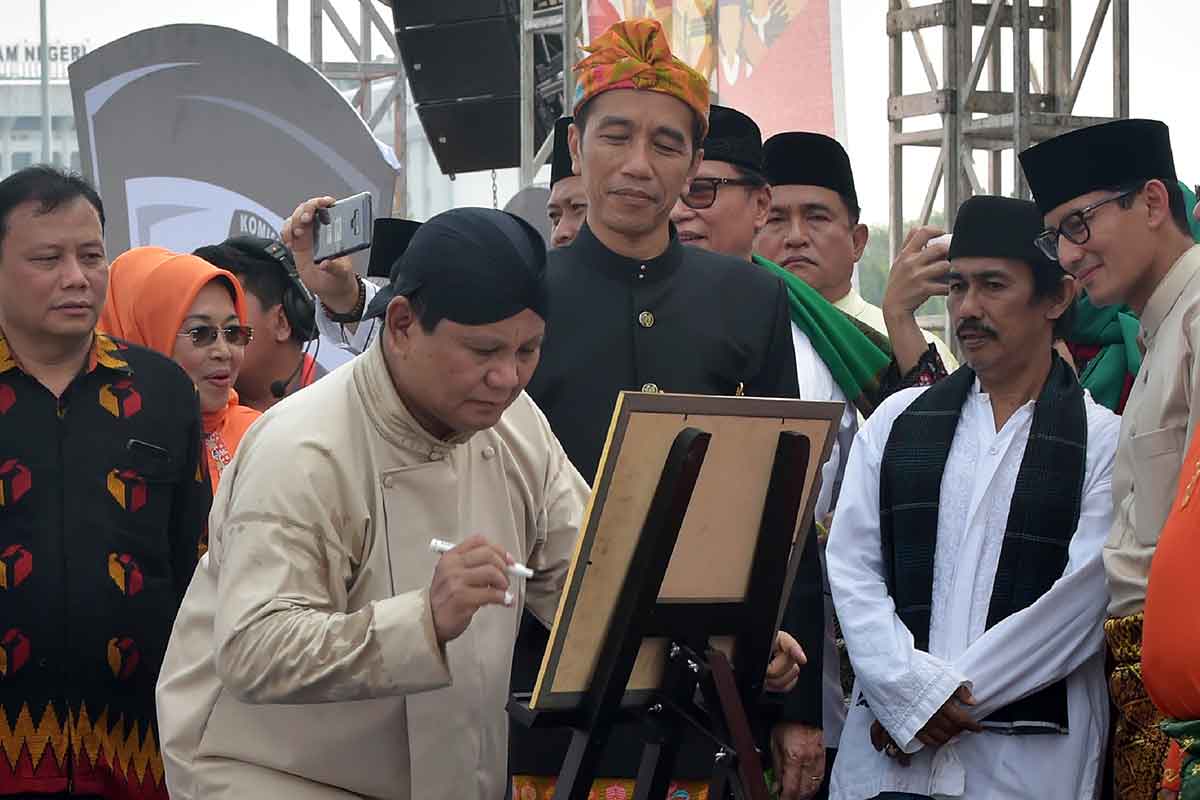Indonesian President Joko Widodo and his challenger Prabowo Subianto are set to face off in the first of a series of debates ahead of the April presidential election.
Seeking to win over swing voters, Widodo, popularly known as Jokowi, will defend his track record on corruption, terrorism, law reform and human rights in Thursday’s presidential debate, while Prabowo will lay out his vision to lure those still undecided.
Although the economy has taken the centre-stage in the election campaign, sporadic terrorist attacks and allegations of human rights violations from Papua to Aceh have marked Jokowi’s tenure, allowing his challenger to project himself as a strongman capable of tackling these issues more effectively.
Jokowi’s approval rating is at 53.2 percent, compared with 34.1 percent for Prabowo, according to a survey by Charta Politika released on Wednesday. The incumbent, a former furniture businessman and the first non-elite to occupy the presidential office, led his rival by 20 points in a December survey by Indikator Politik Indonesia. It also found that the gap between Widodo and Prabowo had closed by five points since September.
Catching up
Prabowo can catch up with Jokowi if he woos the undecided and swing voters. The presidential debates may offer an opportunity to do just that, according to Yunarto Wijaya, executive director of Charta Politika.
The candidates must create new momentum, Wijaya said. “If the public’s narration and conversation related to the presidential election is flat like now, Jokowi will maintain the rhythm and Prabowo will lose.”
Prabowo has picked as his running mate Sandiaga Uno, a business-savvy former private equity investor. He blames the high public debt and slump in the currency to levels not seen since the 1997-98 Asian financial crisis as examples of Jokowi’s mismanagement of the economy. The former general is proposing to revitalise Southeast Asia’s largest economy by slashing taxes on companies and individuals if elected.
Infrastructure focus
For Jokowi, who has limited his campaigning so far to inaugurating toll roads and airports, is seeking a mandate to carry on his agenda of better connecting the country’s scattered islands and transforming Indonesia from a commodity-reliant economy into a manufacturing power. His government has spent billions of US dollars to add roads, ports, dams and airports and created millions of new jobs.
Jokowi, who is supported by nine political parties, picked conservative cleric Ma’ruf Amin as his running mate, partly to fend off attacks from conservative groups, which accuse him of not doing enough to protect the interests of Muslims.
In contrast, Prabowo is backed by hardline groups which were behind large public protest against former Jakarta governor Basuki Tjahaja Purnama, better known as Ahok, who was later jailed after being found guilty of blasphemy.
They’ve already rallied behind Prabowo and their enthusiasm may help him build the momentum in the final months, according to Alexander R Arifianto, a research fellow at S. Rajaratnam School of International Studies in Singapore.
“Prabowo has many hardcore supporters who are highly committed and dedicated to carry him to victory,” Arifianto wrote in a report on Tuesday. “They can potentially make up for his lack of other resources in order to stage a potential upset.” - Bloomberg
